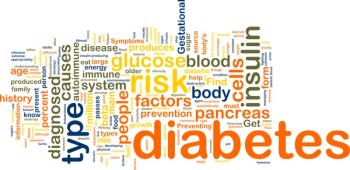
Diabetes
Latest News


Efpeglenatide Cuts Risk of CV Events and Kidney Disease in High-risk T2D Patients, Regardless of SGLT2 Status
Latest Videos

More News

David McIntyre, MD, FRACP, gives an overview of his talk "Diagnosis and Management of Diabetes in Pregnancy During the COVID-19 Pandemic," to be presented at the American Diabetes Association's (ADA) 81st Scientific Sessions.

The once-weekly therapy is also being studied in nonalcoholic steatohepatitis and heart failure with preserved ejection fraction and obesity.

Robert A. Gabbay, MD, PhD, the chief science and medical officer at the American Diabetes Association (ADA), previews sessions to be presented at the ADA's 81st Scientific Sessions.

This article demonstrates that few patient encounters with indicators of need for diabetes self-management education result in a provider referral to the service.

A recent decline in the proportion of adults with diabetes achieving glycemic control may contribute to more diabetes-related health issues and deaths across America.

Human synthetic insulin may offer low-cost, effective treatment for certain patients with diabetes and financial constraints.

The UK analysis came from a larger study that examined the effects of a liquid total diet replacement program to induce remission in type 2 diabetes (T2D).

The FDA said it is the first approved drug for chronic weight management in adults with general obesity or overweight since 2014.

Here is some of the latest news in diabetes from our sister publication Pharmacy Times®.

When drug developers were forced to conduct cardiovascular outcomes trials for SGLT2 inhibitors, they found a surprise: the drugs created for type 2 diabetes (T2D) had strong benefits for heart failure. And the same has proven true in sotagliflozin.

There is a role for pharmacists and pharmacy quality measures in addressing the public health challenge of diabetes, according to speakers at a recent virtual meeting this week.

The researchers undertook the study on diabetes in patients with stroke amid evidence of mortality and hospitalization for some cardiovascular complications declining.

Soft tissue and bone infections, urinary tract infections, stroke, and electrolyte disorder top the reasons why patients with diabetes are admitted to the hospital at greater frequency and cost compared with patients without the disease, according to a new study.

A roundup of diabetes news you may have missed from across MJH Life Sciences™.

Oral semaglutide, when used with basal insulin, is as effective or better than the injectable version in treating type 2 diabetes (T2) while providing similar tolerability.

Diabetes affects corneal endothelial cells in patients that are older, have suffered with the disease for at least a decade, and have high glycated hemoglobin (A1C).

Patients with diabetes who have small kidney size at the beginning of peritoneal dialysis (PD) have a substantial risk of mortality.

The authors of a study in the April 2021 issue of The American Journal of Managed Care® discuss the possible reasons behind the link between care fragmentation and hospitalizations in veterans with diabetes, as well as potential opportunities to address disjointed care in the context of the widespread telehealth uptake seen during the COVID-19 pandemic.

Black patients, female patients, and those of lower socioeconomic status are less likely to be prescribed sodium-glucose cotransporter-2 (SGLT-2) inhibitors for type 2 diabetes (T2D).

The authors said their work is an effort towards making more tailored therapy a reality.

Among patients with type 2 diabetes (T2D) and weight issues, cognitive advantages that women hold over men when both are affected are preserved into later life but are eroded for women carrying apolipoprotein E ε4 alleles.

A high proportion of Marshallese, or Marshall Islanders, living on the mainland Unites States, have undiagnosed hypertension and type 2 diabetes (T2D), according to findings that will be used to address disparities in Native Hawaiian and Pacific Islander populations.

A machine learning model using the gut microbiome may serve as a successful predictive measure for type 2 diabetes development.

Women who received a type 1 diabetes (T1D) diagnosis prior to menstruation onset exhibited shorter reproductive periods compared with healthy controls.

A review found that a low-carbohydrate diet may lead patients with type 2 diabetes to experience disease remission, potentially providing new insight into how clinicians can help patients better manage their disease, investigators concluded.














